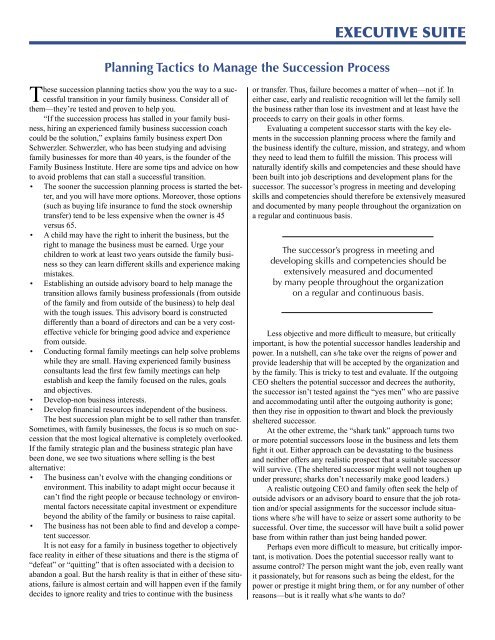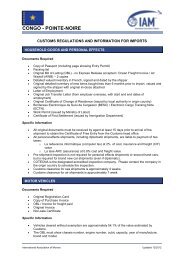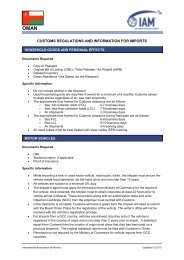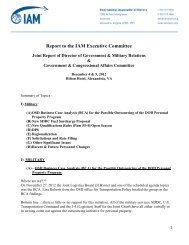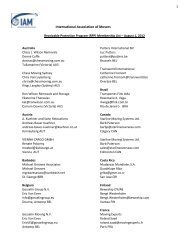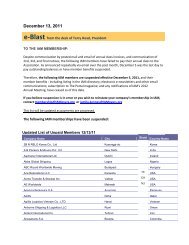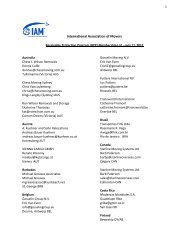Leadership Across Generations: - IAM
Leadership Across Generations: - IAM
Leadership Across Generations: - IAM
You also want an ePaper? Increase the reach of your titles
YUMPU automatically turns print PDFs into web optimized ePapers that Google loves.
Planning Tactics to Manage the Succession Process<br />
These succession planning tactics show you the way to a successful<br />
transition in your family business. Consider all of<br />
them—they’re tested and proven to help you.<br />
“If the succession process has stalled in your family business,<br />
hiring an experienced family business succession coach<br />
could be the solution,” explains family business expert Don<br />
Schwerzler. Schwerzler, who has been studying and advising<br />
family businesses for more than 40 years, is the founder of the<br />
Family Business Institute. Here are some tips and advice on how<br />
to avoid problems that can stall a successful transition.<br />
• The sooner the succession planning process is started the better,<br />
and you will have more options. Moreover, those options<br />
(such as buying life insurance to fund the stock ownership<br />
transfer) tend to be less expensive when the owner is 45<br />
versus 65.<br />
• A child may have the right to inherit the business, but the<br />
right to manage the business must be earned. Urge your<br />
children to work at least two years outside the family business<br />
so they can learn different skills and experience making<br />
mistakes.<br />
• Establishing an outside advisory board to help manage the<br />
transition allows family business professionals (from outside<br />
of the family and from outside of the business) to help deal<br />
with the tough issues. This advisory board is constructed<br />
differently than a board of directors and can be a very costeffective<br />
vehicle for bringing good advice and experience<br />
from outside.<br />
• Conducting formal family meetings can help solve problems<br />
while they are small. Having experienced family business<br />
consultants lead the first few family meetings can help<br />
establish and keep the family focused on the rules, goals<br />
and objectives.<br />
• Develop-non business interests.<br />
• Develop financial resources independent of the business.<br />
The best succession plan might be to sell rather than transfer.<br />
Sometimes, with family businesses, the focus is so much on succession<br />
that the most logical alternative is completely overlooked.<br />
If the family strategic plan and the business strategic plan have<br />
been done, we see two situations where selling is the best<br />
alternative:<br />
• The business can’t evolve with the changing conditions or<br />
environment. This inability to adapt might occur because it<br />
can’t find the right people or because technology or environmental<br />
factors necessitate capital investment or expenditure<br />
beyond the ability of the family or business to raise capital.<br />
• The business has not been able to find and develop a competent<br />
successor.<br />
It is not easy for a family in business together to objectively<br />
face reality in either of these situations and there is the stigma of<br />
“defeat” or “quitting” that is often associated with a decision to<br />
abandon a goal. But the harsh reality is that in either of these situations,<br />
failure is almost certain and will happen even if the family<br />
decides to ignore reality and tries to continue with the business<br />
EXECUTIVE SUITE<br />
or transfer. Thus, failure becomes a matter of when—not if. In<br />
either case, early and realistic recognition will let the family sell<br />
the business rather than lose its investment and at least have the<br />
proceeds to carry on their goals in other forms.<br />
Evaluating a competent successor starts with the key elements<br />
in the succession planning process where the family and<br />
the business identify the culture, mission, and strategy, and whom<br />
they need to lead them to fulfill the mission. This process will<br />
naturally identify skills and competencies and these should have<br />
been built into job descriptions and development plans for the<br />
successor. The successor’s progress in meeting and developing<br />
skills and competencies should therefore be extensively measured<br />
and documented by many people throughout the organization on<br />
a regular and continuous basis.<br />
The successor’s progress in meeting and<br />
developing skills and competencies should be<br />
extensively measured and documented<br />
by many people throughout the organization<br />
on a regular and continuous basis.<br />
Less objective and more difficult to measure, but critically<br />
important, is how the potential successor handles leadership and<br />
power. In a nutshell, can s/he take over the reigns of power and<br />
provide leadership that will be accepted by the organization and<br />
by the family. This is tricky to test and evaluate. If the outgoing<br />
CEO shelters the potential successor and decrees the authority,<br />
the successor isn’t tested against the “yes men” who are passive<br />
and accommodating until after the outgoing authority is gone;<br />
then they rise in opposition to thwart and block the previously<br />
sheltered successor.<br />
At the other extreme, the “shark tank” approach turns two<br />
or more potential successors loose in the business and lets them<br />
fight it out. Either approach can be devastating to the business<br />
and neither offers any realistic prospect that a suitable successor<br />
will survive. (The sheltered successor might well not toughen up<br />
under pressure; sharks don’t necessarily make good leaders.)<br />
A realistic outgoing CEO and family often seek the help of<br />
outside advisors or an advisory board to ensure that the job rotation<br />
and/or special assignments for the successor include situations<br />
where s/he will have to seize or assert some authority to be<br />
successful. Over time, the successor will have built a solid power<br />
base from within rather than just being handed power.<br />
Perhaps even more difficult to measure, but critically important,<br />
is motivation. Does the potential successor really want to<br />
assume control? The person might want the job, even really want<br />
it passionately, but for reasons such as being the eldest, for the<br />
power or prestige it might bring them, or for any number of other<br />
reasons—but is it really what s/he wants to do?


